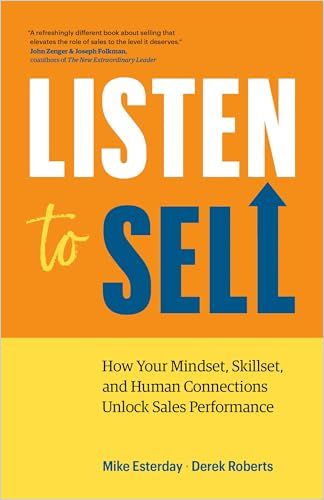Mike Esterday and Derek Roberts provide expert guidance on becoming a more productive, profitable listener and making more sales.

Listening Is Good For Business
Sales coaches, Mike Esterday and Derek Roberts, the founding partners of Integrity Solutions, explain how to listen well and productively to your B2B clients.
Questions and Answers
Selling business-to-business requires asking your prospects intelligent, relevant, targeted, and attention-demanding questions designed to elicit precise answers about their most pressing wants and needs.
However, asking the right questions is a waste of time if you don’t listen carefully to the answers. Many salespeople find the required level and intensity of listening challenging. The clue is to use active listening, a deliberate undertaking that fully engages your hearing and thinking.
Listening [is] the essential thread that runs throughout the entire sales relationship.Mike Esterday and Derek Roberts
Most salespeople do not listen well. Many mistakenly focus, instead, on talking about their products or services. Instead, authors Mike Esterday and Derek Roberts advise, ask intelligent questions that go to the heart of your prospects’ crucial needs. Meet those needs with your products or services, they say, and you can earn a worthwhile living, make human connections, and feel good about the service you provide.
Perhaps the biggest problem salespeople face today is that many prospects no longer believe they need a sales rep. They think they can hop online to get all the product, service, and price information they need. To counter these pressures and demonstrate how a trusted sales rep contributes to a prospect’s decision-making, salespeople need a “values-based, customer-focused” selling approach.
Establishing relationships with your B2B prospects requires listening. While you must be an expert about how your products or services fit into the prospect’s world, you also must develop a mindset — built on avid listening — that enables you to establish trusting, productive relationships.
When prospects refuse to engage, extend trust, or ease your path, don’t lose confidence. If your prospect doesn’t respond with open-ended answers, perhaps you are asking “close-ended and low-impact questions.” Prospects who respond to simple questions with simple answers expect the salesperson to put in more energy and information. Your questions must prove to your prospects that you understand the most crucial aspects of their company and market.
The “AID Process”
In today’s distracted B2B sales environment, salespeople have to work to secure their prospects’ undivided attention.
In most instances, salespeople today have a few minutes, even seconds, once they finally get through to a customer, and they need to get that conversation started.Mike Esterday and Derek Roberts
Esterday and Roberts’ sales consultancy, Integrity Solutions, calls its sales process AID, Inc. The name stands for “Approach, Interview, Demonstrate, Validate, Negotiate, Close,” and the process helps salespeople engage in productive conversations, promote their credibility, and develop relationships. The interview phase is the heart of this process. The quality of your interview depends on the perspicacity of your questions and the answers you elicit and absorb with intense listening to identify prospects’ needs, challenges, and problems.
During your initial conversation, establish rapport. Offer patient, attuned listening to create an atmosphere of warmth. Build the habit of using “your ears more than your mouth.” When you present a product demonstration, show how your offerings meet the prospects’ important wants and needs. Show that you are heeding their feedback. To establish trust, prove your claims.
Sales negotiations call for an active two-way partnership in which you and your clients grapple with their stumbling blocks or concerns. Since making a sale often comes down to price, work with everything your prospects communicate about the structure of their budget and other cost-related issues.
Closing may take many weeks and multiple meetings, particularly in a sales environment with several decision-makers. Closing eventually requires asking your prospects for an “appropriate commitment to action.” Trust the perceptions you have amassed by being a deliberate listener to determine when your customers are ready.
Quality Listening
Effective selling calls for comprehensive preparation. Review professional reports, consultancy white papers, and authoritative publications. To make your presentation compelling and valuable, develop your competitive knowledge and share it in a customer-focused conversation. Emphasize that you want to create value for your prospects. Demonstrate your working knowledge of their industry and their firm’s challenges. Show that your offerings will have a positive, long-lasting impact on your clients’ relationships with their customers.
Customer-focused selling requires that we remain present and intent on hearing and understanding what our customers are actually saying. It is how we value them, and it is why we are trusted when offering solutions to meet their needs.Mike Esterday and Derek Roberts
Esterday and Roberts urge you to provide your prospect with valuable data, wisdom, and well-grounded advice. Differentiate your products or services from those of your competitors.Cite relevant reports, statistical findings, or case histories that demonstrate the special value you bring to your prospect’s business.
Talk to everyone, including yourself
Active listening requires having certain important conversations with yourself, your prospects, your customers, and your sales coaches and managers.
Your conversations with yourself concern how you characterize selling as your profession and your ideas about the value of your offerings. Your conversations with prospects and customers require listening with rapt attention, so they will listen to you. Be sensitive to their words, body language, and the tone and pace of the conversation.
“Truth, respect, and honesty” are the foundations of successful sales. Prospects will react negatively if you sell at them, but they’ll react positively if you engage with them to shape a mutually satisfying transaction. Too many salespeople are quick to tout the value and the benefits of their offerings before they learn what their prospects want and need. Listen first.
Everyone at a closing should feel like a victor.
Listen Well
In this quiet but excellent manual, Mike Esterday and Derek Roberts advocate and explain their consultancy’s values-based sales process, which centers on customers’ wants and needs. When customers get what they want, the authors advise, you also get what you want: a long, fruitful, mutually profitable relationship. Esterday and Roberts’ coaching focuses on listening, interpreting what you hear, and learning from what clients really say, not what you want to hear from them. The authors’ approach is basic, and they repeat themselves often. Whether this is so they can cheerlead for their method or just because they’ve found their pivotal point and they’re sticking to it, only B2B salespeople can discern. They’re the customers Esterday and Roberts are listening to, and they would do well to pay attention.














